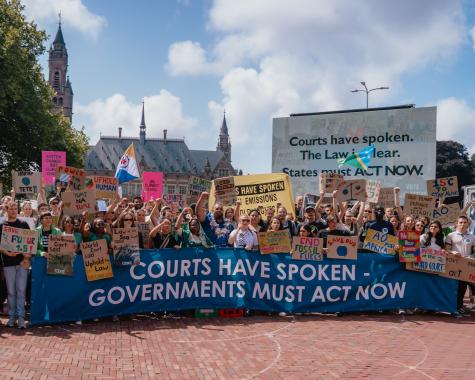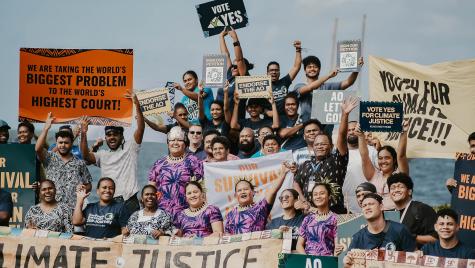Vanuatu ICJ Initiative

➡️ VANUATU ICJ INITIATIVE - Landmark International Court Ruling on Climate Change
In 2019 a group of law students from the University of the South Pacific came up with the idea to approach the UN General Assembly and won the support of Vanuatu.
In March 2023, the Vanuatu ICJ Initiative led to a United Nations General Assembly request of an advisory opinion from the UN's International Court of Justice, seeking clarification of the legal obligations of countries under international law to address the climate crisis.
On July 23, 2025, the ICJ issued its advisory opinion, which was unanimously adopted by all 15 judges: Nations have a legal duty to combat the planetary crisis.
Jump straight to our resources on the ➡️ Vanuatu ICJ Initiative
Explore our comprehensive guides on -
-
The Climate Crisis - over 20,000 links
-
COP30 in Belem 2025
Please share this resource via Twitter, Bluesky, Facebook, Instagram, and LinkedIn
This initiative represents a bold step by small island nations towards addressing the pressing issues of climate justice, debt, mitigation, and adaptation. It was spearheaded by the Pacific Island nation of Vanuatu alongside backing from Antigua and Barbuda, Costa Rica, Sierra Leone, Angola, Germany, Mozambique, Liechtenstein, Samoa, the Federated States of Micronesia, Bangladesh, Morocco, Singapore, Uganda, New Zealand, Vietnam, Romania, and Portugal.
Notable observations included -
-
The human right to a clean, healthy, and sustainable environment is protected by law. Climate protection is a human right.
-
Big polluters are legally obliged to dramatically scale up their efforts to reduce emissions under international law.
-
Governments and parliaments are legally obligated to curb the production and use of fossil fuels, refuse new fossil fuel projects, and reduce public spending on fossil fuels.
-
Governments must legally regulate the climate impacts of companies and businesses.
-
Countries that have historically contributed the most to greenhouse gas emissions hold the greatest weight in addressing the climate crisis by law.
-
There is potential to enforce reparations for nations suffering the worst consequences of climate change, at the expense of historical emitters that have contributed the most to the problem.

By taking this issue to the ICJ, the Vanuatu ICJ Initiative hoped to reinforce the responsibilities of nations to safeguard the planet for current and future generations. It has helped to highlight the vulnerability of small island nations and proved how collective action and legal accountability are important tools on the journey to justice and sustainable development.
The ICJ has, for the first time, officially categorised the climate crisis as an "urgent and existential threat" and emphasised that "cooperation is not a matter of choice for states but a pressing need and a legal obligation."
As the highest court of the United Nations, this legal opinion provides judges worldwide with clear guidance on climate litigation and will shape climate jurisprudence for decades to come. The ICJ opinion can now be used to demand more ambitious climate protection measures from governments and parliaments, to ensure compliance with the Paris Agreement, and to implement national and international climate laws.
The world's highest court has spoken. This isn't just a legal opinion; it's a global imperative – will nations listen?
Please share this resource via Twitter, Bluesky, Facebook, Instagram, and LinkedIn
Work in progress. Expert input is most welcome.
Two other important additional advisory opinions from other international courts:
-
International Tribunal for the Law of the Sea (ITLOS) on the obligations of states on climate change and international law on May 21, 2024.
-
Inter-American Court of Human Rights (IACHR) on the climate emergency and human rights on July 3, 2025.
Author: Dr. Norbert Stute and Rachael Mellor Date: 24.07.25, licensed under CC BY-SA 4.0.
For further reading on the Vanuatu ICJ Initiative and the ICJ ruling see below ⬇️